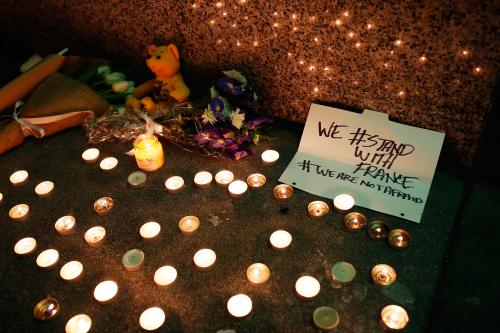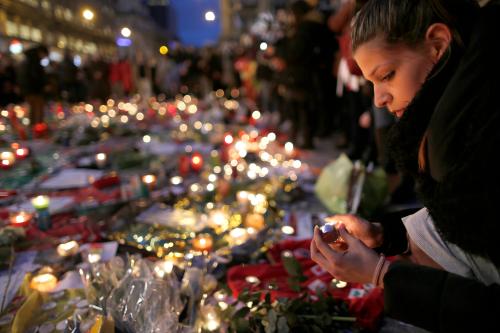France has been struck by an unprecedented three terror attacks in the last 18 months. In what’s called Operation Sentinelle, 13,000 French military personnel now patrol streets and protect key sites across the country, assisting police and other security agencies. “The fact that the armed forces are visible,” said French Defense Minister Jean-Yves Le Drian at a Brookings event on July 20, “help to reassure the French people that they are safe both at home and abroad.”
Do the challenges facing France today mean that it should reduce its engagement overseas, focusing instead on security at home? Le Drian doesn’t think so, and I agree. In a new book titled “Who is the Enemy?,” he particularly emphasizes the multifaceted ISIS threat. As he said at Brookings:
“Every war [has] two enemies…[Today’s] war [with ISIS] also sets in place two concepts of the “enemy” that are radically different: From a strategic point of view, we are dealing with a proto-state; at the heart of this entity, there is a terrorist army.”
It only further complicates matters, of course, that France faces ISIS threats on several fronts: in Syria and Iraq, on the one hand, and also on its own territory. This, Le Drian stressed, means “we must seek coherence in our military action.” It also helps explain why France remains one of the most active countries in the fight against the so-called Islamic State, as well as other extremist groups in the Middle East and in sub-Saharan Africa. In 2013 and 2014, France intervened in Mali in order to prevent jihadi groups from taking over the country. The French military also has a presence in Djibouti, Lebanon, Côte d’Ivoire, the Central African Republic, Gabon, Senegal, as well as in the Pacific (in French Polynesia and New Caledonia)—not to mention Syria, where France uses the Mediterranean Sea-based Charles de Gaulle aircraft carrier to strike ISIS targets.
France is not a warmongering country—rather, it is responding to the fact that overseas threats come to it. Although it remains unclear to what extent the Nice attacker had connections with foreign terrorist networks, it has been established that the November 2015 Paris attacks were planned and orchestrated from Syria. This, among other considerations, has prompted France to engage further in Iraq and Syria. The rationale, as Minister Le Drian explained, is:
“[T]rading our peace by reducing our military involvement doesn’t make sense. The more we let ISIS consolidate its presence on the Middle East, the more it will gather resources, attract fighters, and plan more attacks against us.”
Team player
French policy isn’t just about ensuring its own security—rather, its many contributions are integrated within global efforts, including U.S.-led ones. As Le Drian said at Brookings: “I am convinced that the French-American relationship is stronger and better than ever.” France is a prominent participant of the 66-member international coalition against ISIS, and in that capacity participated in the first joint meeting of that group’s foreign and defense ministers in Washington this month.
France remains a key member of the joint military operation Inherent Resolve in Iraq and Syria, which has damaged or destroyed over 26,0000 ISIS-related targets since August 2014. The Charles de Gaulle carrier—with 26 aircrafts on board—has been an essential part of that coalition mission. Following specific instructions from U.S. Defense Secretary Ash Carter and his counterpart in Paris, Minister Le Drian, French and U.S. intelligence agencies cooperate closely in intelligence-sharing. And just last week, President François Hollande announced that France will soon be supplying artillery to Iraq to support its fight against ISIS. Beyond the Iraq-Syria theater, France is cooperating with the United States and other partners in Libya, another country that is both a victim and source of extremist threats.
The French Defense Ministry’s efforts to double-down on protecting French citizens within France, therefore, has not reduced its overseas role. Particularly now that the United Kingdom will leave the European Union, France’s military role has never been so important. France—along with Germany, which recently suggested it would raise its defense spending significantly—should continue to play a leading role as one the top defense actors in the West.
The Brookings Institution is committed to quality, independence, and impact.
We are supported by a diverse array of funders. In line with our values and policies, each Brookings publication represents the sole views of its author(s).








Commentary
Facing threats at home, France should still engage abroad
July 25, 2016